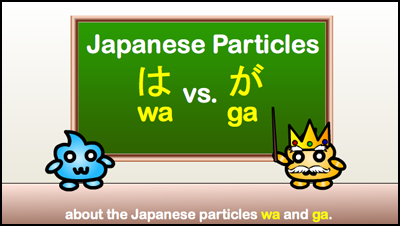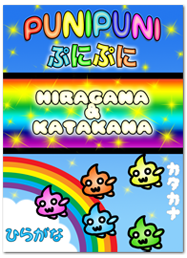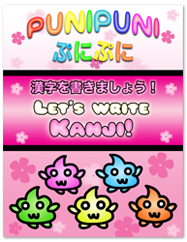☆ PuniPuni Youtube ☆
Japanese Grammar: Japanese Particles wa (は) and ga (が) – Review Notes
Today we learned some of the ways to use the Japanese particles, wa (は) and ga (が). But there are still more ways to use these particles!
Read more to review today’s lesson, see more examples and find out other ways to use these Japanese particles.
………………………………………………………………………………..
Japanese Particles wa (は) vs. ga (が)

★ There is always a lot of confusion surrounding the Japanese particles, wa (は) and ga (が).
★ It is not always easy for learners of Japanese to know when to use one or the other.
★ Both particles have multiple uses, so there is a lot to remember.
★ The hiragana は is pronounced as wa when used as a particle, and ha in all other words.
………………………………………………………………………………..
Japanese Particle ga (が) – Marks subject
★ We learned that the Japanese particle ga (が) marks the subject of the sentence.
★ We will see more uses of this particle after reviewing what we have learned so far.
………………………………………………………………………………..
Japanese Particle wa (は) – Marks topic
★ We learned that the Japanese particle wa (は) marks the topic of the sentence.
…………………………………………………………………………………
A few notes about the topic:
★ The topic is often the same as the subject, but not always.
★ The topic can be anything that a speaker wants to talk about (It can be an object, location or any other grammatical element).
★ It is sometimes compared to the English expressions “As for ~” or “Speaking of ~”
★ It can be omitted from the sentence in many cases. In this example, you can remove the words in the parentheses and it means the same thing:
(私は)ぷにぷにです。
(Watashi wa) PuniPuni desu.
I am PuniPuni.
…………………………………………………………………………………
Asking Questions: wa (は) or ga (が)?
★ When a question word (who, where, etc.) comes after the topic in the sentence we use the particle wa (は).
.………………………………………………………………………………..
Example:
トイレはどこですか。
toire wa doko desu ka?
Where is the bathroom?
★ In this sentence, the question word doko (where) comes after the topic (toire – bathroom), so we use the particle wa (は).
…………………………………………………………………………………
★ When a question word is or is part of the subject, (at the beginning of a sentence) we use the particle ga (が).
…………………………………………………………………………………
Example:
だれが来ますか。
dare ga kimasu ka?
Who will come?
★ In this sentence, the question word dare (who) is the subject, so we use the particle ga (が).
…………………………………………………………………………………
More about wa (は) and ga (が)
★ Use ga (が) when information about a subject is important or situationally new to the listener and/or the speaker.
★ Once the subject has been mentioned, wa (は) is used to refer to the same subject in sentences following (it becomes the topic of the sentence.)
………………………………………………………………………………..
Example:
★ The first sentence uses ga (が) because inu (dog) is a new subject.
★ In the second sentence, the subject that was already mentioned (inu – dog) becomes the topic and is marked with the particle wa (は).
………………………………………………………………………………..
Using the particle wa (は) to show contrast
★ The particle wa (は) can also be used to show contrast.
肉は食べますが、魚は食べません。
Niku wa tabemasu ga, sakana wa tabemasen.
I eat meat, but I don’t eat fish.
★ In this usage, the thing that is being contrasted is not always stated, but it is implied. For example:
あの映画は見ませんでした。
Ano eiga wa mimasen deshita.
I didn’t see that movie (but I saw this one).
………………………………………………………………………………..
Using the particle ga (が) as emphasis
★ Ga (が) can also be used to emphasize the subject or distinguish it from others. Compare the two following examples. The second one might come as a response to the question “Who is Sara?”
………………………………………………………………………………..
Example 1:
私はサラです。
Watashi wa Sara desu.
I am Sara.
………………………………………………………………………………..
Example 2:
私がサラです。
Watashi ga Sara desu.
I am (the one who is) Sara.
………………………………………………………………………………..
Ga (が) as “but”
The particle ga (が) can be used to connect two sentences as but.
………………………………………………………………………………..
Example:
行きたいですが、お金がないです。
Ikitai desu ga, okane ga nai desu.
I want to go but I don’t have money.
………………………………………………………………………………..
Ga (が) in special circumstances
The object of the sentence is usually marked by the particle o (を) but some verbs and adjectives (expressing like/dislike, desire, potential, necessity, fear, envy etc.) take ga (が) instead of o (を).
………………………………………………………………………………..
Example 1:
猫が好きです。
Neko ga suki desu.
I like cats.
………………………………………………………………………………..
Example 2:
日本語が分かりません。
Nihongo ga wakarimasen.
I don’t understand Japanese.
………………………………………………………………………………..
Conclusion:
Today we learned how to use the Japanese particles wa (は) and ga (が). It is going to take some getting used to, and you still might not always remember which one to use in every situation. It is important to practice using them and hearing them be used in sentences to understand them better.
I hope you enjoyed today’s lesson! If you have any questions, leave a comment below (◕ω◕)♪
………………………………………………………………………………..
Get Puni Puni Japanese Phrase book!
Do you want to know a lot of Japanese words & phrases ? I recommend you to get Puni Puni Japanese Phrase book! This is phrasebook (e-book) includes over 700 phrases that are useful in daily life!
Click the image and get yours now\(◕ω◕)/♥
………………………………………………………………………………..
Do you want a Japanese tutor?
Take Japanese Skype Lessons with Professional Japanese Teachers on kakehashijapan.com!
………………………………………………………………………………..
………………………………………………………………………………..













21 comments
Using the particle wa (は) to show contrast
★ The particle wa (は) can also be used to show contrast.
肉は食べますが、魚は食べません。
Niku wa tabemasu ga, sakana wa tabemasen.
I eat meat, but I don’t eat fish.
Please fix this if there is an typo. The explanation is for wa, but the sentence is about ga.
Comment by Jannavi on 12/27/2012 at 1:57 pmI think you might be misunderstanding this part. The focus of this sentence is the particle “wa” as contrast, but it also uses the particle “ga” (meaning ‘but’ in this case). This example is meant to show how the particle “wa” can be used to contrast two subjects, “niku” (meat) and “sakana” (fish). The explanation for the use of “ga” as “but” can be found later in the notes. Sorry if that was confusing (◕ω◕)☆ If you’re still confused, let me know and I will try to explain better♥
Comment by PuniPuni on 12/27/2012 at 3:17 pmI understand it now. Thanks so much!!!!!
Comment by Jannavi on 12/27/2012 at 9:40 pmどういたしまして! \(◕ω◕)/☆ you’re welcome♥
Comment by PuniPuni on 12/27/2012 at 10:04 pmi know it’s out of the topic but i just want to know if i’m doing it right. is the japanese of “i want to go outside because the room is dark” is: わたしはそとですきいけますへやは暗いで。 by the way, the way you explain things are much better than the others. specially when you highlights the words that match. thanks.
Comment by ezekiel on 04/24/2013 at 10:21 pmYou can say: 部屋は暗いので、外に行きたいです。(heya wa kurai no de, soto ni ikitai desu.) I will break it down into smaller pieces so that you can see how the sentence was formed. 部屋は暗い (heya wa kurai) means “room is dark.” ので (no de) means “because”. 外に行きたいです (soto ni ikitai desu) means “I want to go outside.” Hope that helps! (◕ω<)b☆
Comment by PuniPuni on 04/25/2013 at 7:01 pm(市長)本日は この記念すべき日を迎える事が できた事に。
How about here, what is the use of は here in the first part of the sentence which is 「本日は」?
Comment by shion on 07/24/2013 at 5:16 amI’ve encountered this line in the drama series of あまちゃん in NHK World Premium as I was watching.
は marks the topic of the sentence, which in this case is 本日 (today) (◕ω◕)☆
Comment by PuniPuni on 07/30/2013 at 1:21 amAh! Now I get it! 😀 thanks 🙂
Comment by shion on 08/02/2013 at 7:40 amHow do you refer back to a subject or action?
Comment by Alyssa on 11/08/2013 at 2:23 pmFor example, if I have already said “I don’t have to wash dishes at home” and I want to say in the next sentence, “Mom does *it* for me,” how do I write *it*? Do you replace “wash dishes” with は, in order to say *it* and not have do say the action again?
Can I say “母はあげます” instead of having to say “母はさらおあらってあげます”?
You should say 母がしてくれます。”My mom does (it) for me.” Actually, in Japanese, you don’t even need to put a word like “it” in this kind of sentence. You just need the subject and the verb (you can leave out the object). Hope that helps! (◕ω◕)♥
Comment by PuniPuni on 11/08/2013 at 7:41 pmHi. How do you explain me the particle は in the following?
東京は桜が満開です = Cherry blossoms are in full bloom in Tokyo.
Why is the は translated as “in”? If I translate as “as for”, this is often strange to English speakers.
Comment by dwi on 04/08/2014 at 9:41 amThis is a typical 〜は〜が〜 pattern that is often seen in Japanese. There is no direct translation into English because Japanese particles and grammar in general does not always function the same way as English grammar. Instead of asking “why,”
Just remember this pattern. Tokyo is the topic. That is why you can use the English expression “as for” because Tokyo is what we are talking about. However, Tokyo is not the subject. This is where Japanese and English are not the same grammatically. In this sentence, 桜 (Cherry Blossoms) is the subject of the sentence, which is why it is marked by the particle が.
This 〜は〜が〜 pattern is used in many situations to describe things. In this case, it is describing the Sakura in Tokyo.
If you cannot understand the translation or the explanation, then it is because you have not yet mastered the basic grammar of Japanese. Don’t worry so much about each little thing. Just try to get used to the language bit by bit. Otherwise, you will drive yourself crazy with questions like these.
Comment by PuniPuni on 04/10/2014 at 9:19 amwakarimashita . arigatou gozaimasu punipuni (^-^)
Comment by iltimas on 04/26/2014 at 6:39 pmHi PuniPuni!
I got a couple questions regarding usage of “no”, “wa”, “ga” and “ni”.
First example:
Watashi wa pasupooto ga arimasu. – No. 1
Watashi no pasupooto ga arimasu. – No. 2
Second example:
Watashi wa nihon-go ga heta desu. – No. 3
Watashi no nihon-go ga heta desu. – No. 4
Third example:
Kodomo wa ima uchi ga imasen. – No. 5
Kodomo wa ima uchi ni imasen. – No. 6
Please do enlighten me. Which No. is the correct one between the two of them in each example?
I don’t know if you could see my confusing point, but I certainly do hope so.
Comment by Newbie on 05/22/2014 at 1:32 amFirst Example:
Both are okay, but they mean different things:
“Watashi wa pasupooto ga arimasu.” means “I have a passport.”
“Watashi no pasupooto ga arimasu.” means “My passport is there.” This might sound better in context (if it’s just this its hard to understand *where* the speaker’s passport is…)
Second example:
“Watashi wa nihon-go ga heta desu.” – This is OK.
“Watashi no nihon-go ga heta desu.” – This sounds unnatural. If you replace “ga” with “wa” it is okay.
Third example:
“Kodomo wa ima uchi ga imasen.” – this doesn’t make sense.
“Kodomo wa ima uchi ni imasen.” – This one is OK.
Hope that helps (◕ω<)♡
Comment by PuniPuni on 05/23/2014 at 8:13 pmArigatou gozaimashita.
Comment by Wiwy on 05/23/2014 at 8:37 amI’ve been so confused about wa and ga.
With this, i can use them correctly.
Hontou ni arigatou
Hello, I just want to know if I put together this sentence correctly. “私はあなたが必要です” it is suppose to mean “I need you”. Is that correct? Also if I remove the 私は part, will it still be okay?
Comment by marta on 06/06/2014 at 9:08 amYes, that is right. You can abbreviate by removing 私は. (◕ω◕)☆
Comment by PuniPuni on 06/06/2014 at 10:21 amHi
Is Ga particle used to indicate certainity?
Comment by Nandhini on 06/09/2014 at 2:27 pmAnd in the sentence – Dorega sensei no kaban desu ka? – why is Ga used here? Please help.
is it possible that a single sentence could have
Comment by vibez on 06/18/2014 at 1:15 am2 particle が ?????